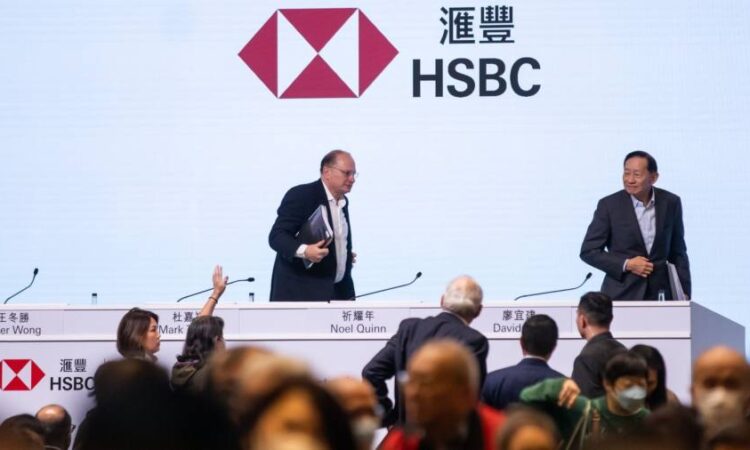
HSBC chair Mark Tucker has been forced to defend the purchase of Silicon Valley Bank’s UK business at a fractious meeting with shareholders in Hong Kong.
Local investors at the event in Kowloon’s international trade centre were forthright in their criticism of the bank’s senior leadership, over a deal struck in the course of a weekend after California-based SVB was shut down by regulators.
One shareholder said it seemed too rushed and risky and asked whether HSBC was acting on the orders of the UK government, remarks that prompted applause from the hundreds-strong audience.
Ken Lui, a shareholder who has launched a campaign for HSBC to spin off its Asian business, said he was concerned because the bank “said that the due diligence was only done for five hours” on the SVB deal. “Will this be a new level of M&A due diligence in the future?”
Tucker sounded frustrated by the scepticism. “We paid one pound, one pound for this company,” he said. “This was too good an opportunity to turn down.”
He added that he wanted “to correct the view that this was something that the UK government asked us to do” because “it was the other way around”. HSBC’s due diligence had found “there were no fundamental issues” with SVB’s UK business, he said.
Tucker told another shareholder they were “completely wrong” to suggest the UK government had instigated the SVB deal.

The public friction shows that HSBC has yet to fully convince its Hong Kong investors, a crucial constituency for the bank because an unusually high proportion of its stock is owned by small shareholders.
HSBC, which is listed in London but makes most of its profits in Asia, said two years ago that it would move the “heart of the business to Asia”. Tucker said on Monday that Hong Kong was the bank’s “spiritual home”.
Yet for some Hong Kong shareholders, the decision to buy the British operations of the failed US bank is another sign that it remains too UK-centric. HSBC cancelled its dividend in 2020 under pressure from the Bank of England during the pandemic. Many Hong Kong shareholders rely on HSBC’s steady dividend payouts and were angered by the move.
At the meeting on Monday, one shareholder described the dividend cancellation as a sign that the bank was driven by what the UK establishment wanted.
Frustration about the dividend paved the way for Chinese insurer Ping An to launch a disruptive campaign for the bank to split its Asian and western operations.
“We understand how disappointed you were by the cancellation of the dividend in 2020,” Tucker said. “Those were highly, highly unusual circumstances . . . we do not expect to see this repeated.”
He also reiterated the bank’s position that splitting its business would “materially destroy value for shareholders”, adding that it would also put dividends at risk.
HSBC uses the Hong Kong shareholder meeting, which happens ahead of its UK annual general meeting, to try to set out its stall to local investors there. It is held in a sprawling venue outside the city centre that is part shopping centre, part conference hall.
Asked whether US banking collapses would affect investors in Hong Kong or HSBC customers, Tucker said there was “no immediate impact on us”, though bank share prices globally had fallen. HSBC had “strong liquidity and strong capital”, he added.
Chief executive Noel Quinn said HSBC had bought SVB’s UK business for “what we believe to be a very good valuation”.
“We saw that business as having over 3,600 of some of the most innovative technology and life science businesses in the UK,” many of which had “the potential to go global”, he said.
Additional reporting by Gloria Li





